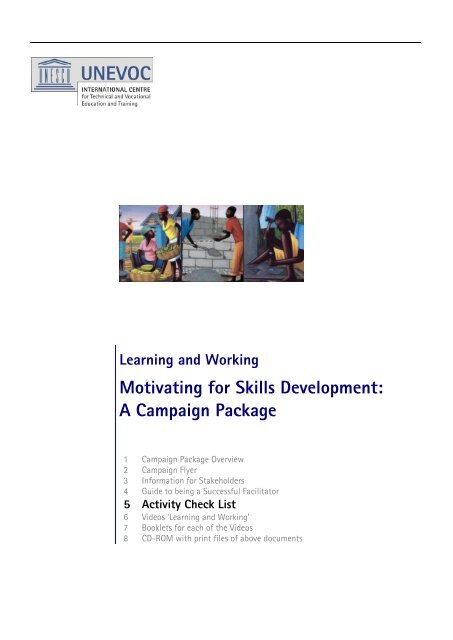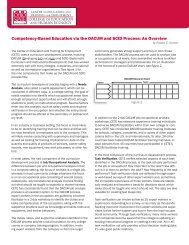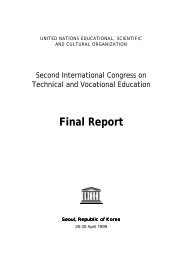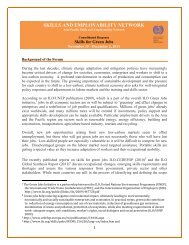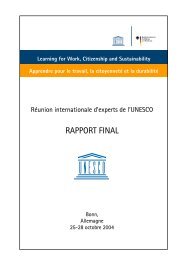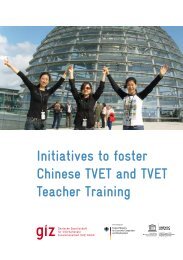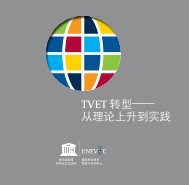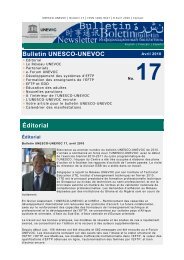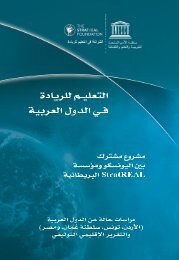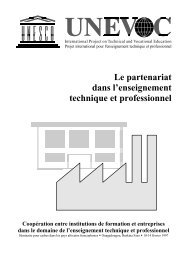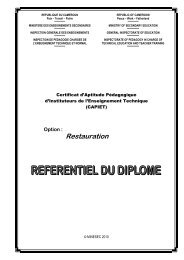Activity Checklist - Unesco-Unevoc
Activity Checklist - Unesco-Unevoc
Activity Checklist - Unesco-Unevoc
Create successful ePaper yourself
Turn your PDF publications into a flip-book with our unique Google optimized e-Paper software.
Learning and Working<br />
Motivating for Skills Development:<br />
A Campaign Package<br />
1 Campaign Package Overview<br />
2 Campaign Flyer<br />
3 Information for Stakeholders<br />
4 Guide to being a Successful Facilitator<br />
5 <strong>Activity</strong> Check List<br />
6 Videos ‘Learning and Working’<br />
7 Booklets for each of the Videos<br />
8 CD-ROM with print files of above documents
Page 1 <strong>Activity</strong> Check List Page 1<br />
Purpose of the <strong>Activity</strong> Check List<br />
This <strong>Activity</strong> Check List is meant for those planning and carrying out Motivation Campaigns at the local<br />
level (stakeholders and facilitators). It should help in achieving the overall goal: motivating members of<br />
marginalised groups to become involved in vocational training and to engage in income-generating<br />
activities.<br />
It illustrates the various preparatory steps that might need to be taken or adjusted to particular local<br />
contexts.<br />
It serves also as a basis for feedback, recommendations and suggestions for the further development and<br />
improvement of the Motivation Campaign Package.<br />
The <strong>Activity</strong> Check List covers three stages:<br />
• planning the Motivation Campaign,<br />
• monitoring the implementation of the Motivation Campaign,<br />
• evaluating the Motivation Campaign.<br />
While local campaigns might vary in nature, target group and organisation, this <strong>Activity</strong> Check List is a<br />
general framework. Please feel free to respond only to those items that apply to your specific situation,<br />
and to add issues that you consider important, but that have not been addressed in the <strong>Activity</strong> Check<br />
List.<br />
Please feel free to produce as many copies as you need. Last but not least, make sure to record your<br />
experiences, and send your feedback to the UNESCO-UNEVOC International Centre (see contact details<br />
at the end).<br />
Identification and contact details<br />
1. Name and contact details (mailing address, telephone, fax, e-mail) of the person(s) filling in this<br />
form:<br />
2. What was your task in the Motivation Campaign?
Page 2 <strong>Activity</strong> Check List Page 2<br />
Planning of the Motivation Campaign<br />
The planning of the Motivation Campaign should be done very thoroughly to minimise risks and to<br />
maximise its success. While only one person or institution should be the responsible for the overall<br />
running of the Motivation Campaign(s), there will be several other parties also involved in the process,<br />
such as other stakeholders, the target group and the facilitators. Everyone needs to be well aware of<br />
what their roles and responsibilities are.<br />
The planning process should cover several aspects, some of which are:<br />
• clarifying the goals of the campaign,<br />
• identifying the target group,<br />
• setting up the team and distributing responsibilities,<br />
• a realistic time plan,<br />
• a realistic budget plan,<br />
• a risk assessment.<br />
Goals of the Motivation Campaign<br />
3. Why are you personally engaged in the Motivation Campaign?<br />
4. Do you have additional goals in mind, in addition to those given in the Motivation Campaign<br />
Package?<br />
Target Group<br />
5. Who do you want to reach, to motivate? Who is your target group? Why did you choose this target<br />
group?
Page 3 <strong>Activity</strong> Check List Page 3<br />
6. How will you be able to contact the target group and get their approval to carry out the Motivation<br />
Campaign with them?<br />
7. Who might help you in reaching the target group?<br />
(Local leaders, community centres, schools, non-governmental organisations, flyers, posters, etc.)<br />
8. How will you announce the campaign? (Posters, printed handouts, personal communication etc.)<br />
9. How will you stay in touch with the target group after the campaign to assess the impact?<br />
Stakeholders<br />
10. Who should be involved in the planning and implementation of the campaigns?<br />
11. Which role does each stakeholder have in the planning and implementation of the campaign? Who<br />
is responsible for what?
Page 4 <strong>Activity</strong> Check List Page 4<br />
12. Who is the person/institution responsible for the overall running of the campaign?<br />
13. How are the stakeholders going to cooperate?<br />
(Regular progress reports? Regular meetings? If yes, where and how often?)<br />
Timing<br />
The person/institution responsible for the running of the campaign should draw up a realistic time plan<br />
that gives a schedule for all the project steps that have to be carried out. This time plan has to be<br />
communicated to all other team members, so that everyone is aware of the deadlines they have to meet.<br />
14. When do you intend to run the Motivation Campaign?<br />
(Think of time needed for its proper preparation. Bear in mind seasonal constraints such as rainy season<br />
which might make transport difficult, or harvesting season which might prevent you from reaching<br />
rural populations, etc.)<br />
15. What is your timetable for preparation? Which deadlines do you need to observe?<br />
16. What preparatory steps are necessary and how long does each take?
Page 5 <strong>Activity</strong> Check List Page 5<br />
17. What is your schedule for running the campaign at local level?<br />
(One day? Several days in a row? Several workshops over a longer period of time? Etc.)<br />
Venue<br />
18. What will be the venue(s) for the Motivation Campaign? How many people can it accommodate?<br />
19. Is the venue easy to reach by the members of the target group?<br />
20. What kind of equipment is available at the venue, what equipment do you need to bring yourself? Is<br />
there electricity?<br />
21. Is there a need for accommodation for the facilitator? If so, where will he/she stay?
Page 6 <strong>Activity</strong> Check List Page 6<br />
Budget<br />
The availability of budget will have implications for the scope of the campaign. The following items<br />
should be considered when drawing up the budget for the Motivation Campaign.<br />
22. Which physical resources will you need?<br />
(Printing, venue, DVD equipment, power supply, video screen, sound equipment, catering etc.)?<br />
23. Is there a need for transport (for participants, for the facilitator, for equipment)?<br />
24. Which “human resources” will you need and what will they cost?<br />
(Facilitators (training & salaries), other support personnel?)<br />
25. What will the total cost incurred be? Is the budget available? What are your budget sources? How<br />
many people can you reach with this budget?<br />
Risk Assessment<br />
Risks are any factors that might hinder or endanger the success of your activity. To identify possible risks<br />
in advance will help you assess their possible impact on the running of the Motivation Campaign and to<br />
plan preventive or countermeasures.<br />
26. Which factors could occur that would slow down or prevent the success of the Motivation<br />
Campaign?
Page 7 <strong>Activity</strong> Check List Page 7<br />
27. How high do you estimate the probability that these factors occur?<br />
28. What impact will these factors have on the running of the Motivation Campaign?<br />
29. What measures can you take to prevent or minimise these risks? What countermeasure can you<br />
take should the problem become real?<br />
Monitoring the Motivation Campaign<br />
It is important to monitor the running of your Motivation Campaign. This means to keep an eye on your<br />
activities and to observe if everything is going according to plan. By constantly doing this, you will be<br />
able to notice foreseen and unforeseen risks and to take appropriate countermeasures in time. This<br />
information will also be essential for the planning and implementation of any future campaigns.<br />
30. Have preparations developed according to plan? What developed differently? Why?<br />
31. Have you succeeded in reaching the target group? Have you reached others than those intended?<br />
Why?
Page 8 <strong>Activity</strong> Check List Page 8<br />
32. Are the other stakeholders (local leaders, employers, training providers etc.) engaging in the<br />
campaign?<br />
33. Was there a language problem? If yes, how did you solve it?<br />
Did you do your presentation in a local language (a language other than the ones available in the video<br />
sound)?<br />
34. Did you encounter technical problems (e.g. venue, video, sound, transport)?<br />
If so, please explain.<br />
Evaluating the Motivation Campaign<br />
For the evaluation of the Motivation Campaign, it is important to have carried out a baseline assessment<br />
before running the campaign. This way, you can compare the “before” and “after” status of your target<br />
group and see whether your activities had an impact.<br />
35. Do you any have indication that the motivation for learning and working has increased among the<br />
target group?<br />
36. What do you think, in particular, raised the motivation?
Page 9 <strong>Activity</strong> Check List Page 9<br />
37. If you feel motivation for learning and working has not increased, what do you think was the<br />
reason?<br />
38. Do you know of any concrete skills development and work activities that emerged from the<br />
campaign?<br />
39. Will you assess the impact of the campaign again after some months’ time?<br />
40. Do you intend to run more Motivation Campaigns? Will you recommend others to run them?<br />
Improving the Motivation Campaign Package<br />
41. Which parts of the Motivation Campaign Package were particularly useful? In which way?<br />
42. What was missing and should be added to the Motivation Campaign Package?
Page 10 <strong>Activity</strong> Check List Page 10<br />
43. Which concrete proposals do you have for the future development of the Motivation Campaign<br />
Package contents?<br />
44. Do you have any observations on the current dissemination format of the Motivation Campaign<br />
Package (print materials, videos, CD-ROM with copies of all documents)?<br />
45. Any other comments?<br />
Please make sure that a copy of the filled form is being sent to the<br />
UNESCO-UNEVOC International Centre<br />
Herman-Ehlers-Str. 10<br />
53113 Bonn<br />
Germany<br />
Fax: [+49] 228 8150-199<br />
E-Mail unevoc@unesco.org
The Campaign Package<br />
This Campaign Package has been developed and provided by the UNESCO-UNEVOC International Centre for Technical and<br />
Vocational Education and Training, Bonn, Germany. Its purpose is to facilitate the organisation of campaigns for mobilisation and<br />
motivation of young people, and for providing them with vocational orientation and guidance. The focus is on marginalised youth<br />
in the informal sector of least developed countries.<br />
The package consists of eight components.<br />
The current pilot version is being provided in English only. It will be evaluated in the field. Depending on the feedback that<br />
UNESCO-UNEVOC will receive, the package will be developed further.<br />
The activities presented in this Campaign Package are not a guarantee of monetary success. The content is based on research,<br />
examples and advice from experts. Every attempt was made to ensure accuracy, and neither the authors nor the UNESCO-<br />
UNEVOC International Centre can be held responsible for incorrect information or changing circumstances.<br />
UNESCO-UNEVOC International Centre<br />
Hermann-Ehlers-Str. 10<br />
53113 Bonn<br />
Germany<br />
unevoc@unesco.org<br />
www.unesco.org/unevoc<br />
www.unevoc.unesco.org/learning+working<br />
Authors:<br />
Yael Eichner, Astrid Hollander, Sharon Kirabo-Steffens, Hans Krönner<br />
Digitalisation of booklets:<br />
Ian Ponce, Jordan Wolfe<br />
ISBN 978-92-95071-21-6 (online)<br />
© UNESCO 2006


